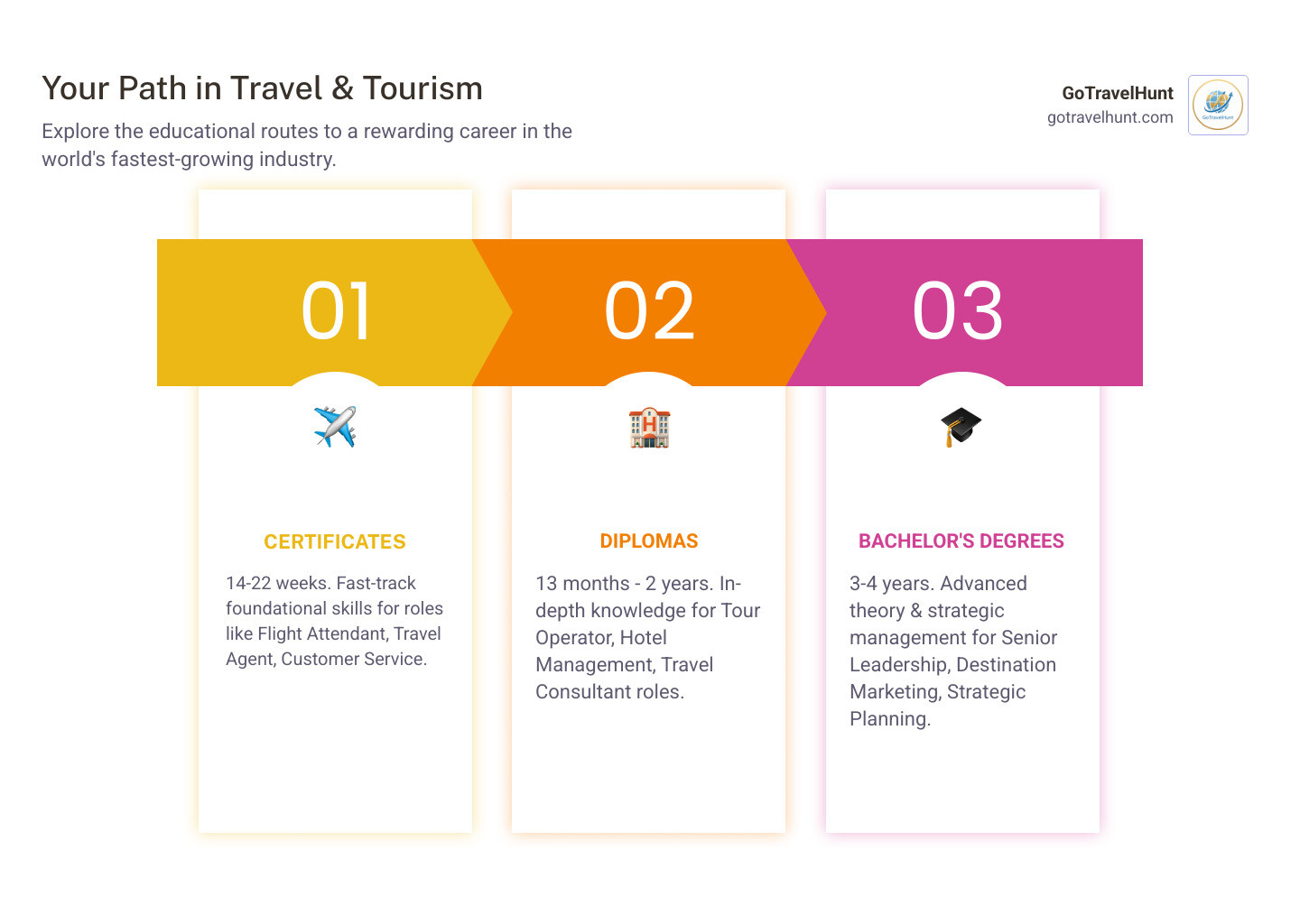Travel and Tourism Courses: Your Best Start 2025
Why Travel and Tourism Courses Matter for Your Career
Travel and tourism courses prepare you for a career in one of the world’s fastest-growing industries by teaching essential skills like customer service, destination knowledge, sales, and operations management.
Quick Overview of Travel and Tourism Courses:
| Course Type | Duration | Best For | Career Path |
|---|---|---|---|
| Certificates | 14-22 weeks | Quick entry into the industry | Flight attendant, travel agent, customer service |
| Diplomas | 13 months – 2 years | In-depth industry knowledge | Tour operator, hotel management, travel consultant |
| Bachelor’s Degrees | 3-4 years | Leadership and specialization | Senior management, destination marketing, strategic planning |
The travel and tourism industry is growing exponentially, employing over 200 million people worldwide. It offers careers ranging from planning dream vacations to managing luxury resorts.
Starting salaries typically range from $23,000 to $28,000 per year, but with experience, professionals can earn $30,000 to $100,000 or more. For example, experienced travel agents in New Zealand earn between $65,000 and $95,000+ annually.
This field offers great variety, with specializations in ecotourism, aviation, event planning (MICE), or culinary tourism. Many courses also lead to globally recognized professional certifications from bodies like IATA (International Air Transport Association) or ACTA (Association of Canadian Travel Agencies), which can significantly boost your career prospects.
As the founder of GoTravelHunt, I’ve seen what makes travel and tourism courses valuable for aspiring professionals. Let this guide help you turn your passion for travel into a rewarding career.

Why Pursue a Career in Travel and Tourism?
A career in travel and tourism means turning your passion for exploration into a profession. The industry is booming, offering incredible variety and global opportunities. You could be planning a luxury cruise one day and a corporate retreat the next, constantly learning about new destinations and cultures.
While starting salaries range from $23,000 to $28,000 per year, this industry rewards experience. With specialized knowledge, you could earn $30,000 to $100,000 or more. For example, experienced travel agents in New Zealand earn between $65,000 and $95,000+ annually. The skills you gain are transferable worldwide, giving you the freedom to live and work almost anywhere. More info about Luxury Travel Experiences.

Skills and Knowledge Gained
Travel and tourism courses provide a toolkit of practical skills that employers seek.
- Technical Skills: You’ll master GDS systems like Amadeus, Sabre, and Apollo for booking flights, hotels, and car rentals. You’ll also learn sales techniques focused on understanding traveler needs and get comfortable with automation tools that streamline operations.
- Customer Service: Training teaches you to handle everything from simple questions to complex problems with grace and efficiency.
- Soft Skills: You’ll develop strong communication skills to explain complex itineraries and listen to client needs. Problem-solving becomes second nature as you learn to handle travel hiccups like missed connections or last-minute changes.
These skills are valuable in any career path, especially if you enjoy helping families create lasting memories. More info about Family Travel Tips.
The Benefits of Professional Certification
Think of professional certification as your career accelerator. It provides:
- Industry Recognition: Certifications from respected organizations like ACTA (Association of Canadian Travel Agencies) and IATA (International Air Transport Association) make your resume stand out.
- Career Advancement: Certified professionals are often considered first for management roles and better pay.
- Specialized Knowledge: Certification programs offer deep expertise in niches like airline operations or hotel management.
- Networking Opportunities: These programs connect you with instructors, peers, and industry leaders.
IATA’s internationally recognized qualifications are designed to maximize your career opportunities in this expanding field. Explore IATA’s internationally recognized courses to see how they can boost your professional profile.
Types of Travel and Tourism Courses and Programs
Choosing the right educational path in travel and tourism courses depends on your career goals and timeline. Programs generally fall into three categories: certificates for quick entry, diplomas for in-depth knowledge, and bachelor’s degrees for leadership roles. Many institutions also offer accelerated programs, packing comprehensive knowledge into shorter timeframes.
| Course Type | Duration | Focus | Career Outcomes |
|---|---|---|---|
| Certificates | 14-22 weeks | Foundational skills, specific roles (e.g., flight attendant, basic travel agent) | Entry-level positions, quick employment |
| Diplomas | 13 months – 2 years | In-depth industry knowledge, management skills, specialized operations | Travel consultant, tour operator, hotel front office, MICE coordinator |
| Bachelor’s Degrees | 3-4 years | Advanced theory, strategic management, research, leadership development | Senior management, destination marketing, tourism policy, academia |
Certificates: Your Quickest Entry Point
Certificate programs are the fastest way to start your travel career, getting you job-ready in a few months. These focused travel and tourism courses teach essential skills for specific entry-level roles. For example, the NZ School of Tourism offers a 22-week Certificate in Tourism (Aviation, Tourism and Travel) and a 14-week Certificate in Aviation (Flight Attending). These programs focus on practical, hands-on skills that employers value immediately. See New Zealand’s certificate options to explore these quick-entry programs.
Diplomas: In-Depth and Industry-Focused
Diploma programs offer a balance of theoretical knowledge and practical application, preparing you for management or specialized roles. Many are offered in accelerated formats; for instance, Travel College Canada’s comprehensive 700-hour International Travel & Tourism Diploma Program can be completed in 13 months. IATA also offers new job-focused diplomas that provide excellent pathways to professional certification. For a structured progression, the NZ School of Tourism offers Level 5 and Level 6 Diplomas in Tourism & Travel Management. Discover IATA’s job-focused diplomas to see how they can accelerate your development.
Bachelor’s Degrees: For Leadership and Specialization
For those aiming for senior leadership, policy development, or academic roles, a bachelor’s degree is the best path. These three- to four-year travel and tourism courses cover advanced theory, strategic management, and research, teaching you to lead and innovate within the industry. Many schools offer diploma-to-degree transfer pathways, allowing you to build on a diploma and potentially finish a four-year degree in three years. These programs prepare you for senior roles in destination marketing or tourism policy. Find tourism bachelor’s programs in Europe to explore international options.
Navigating Your Education in Travel and Tourism Courses

When choosing travel and tourism courses, consider the admission requirements, your learning style, and your specific interests. Most certificates and diplomas require a high school diploma or equivalent, while bachelor’s degrees have higher academic prerequisites. Always check with the specific institution for their requirements. It’s also important to consider whether you prefer in-person or online learning to find a program that fits your life.
How to tailor your travel and tourism courses to your interests
The travel industry is diverse, and you can shape your education around your passions.
- Ecotourism: Focus on sustainable travel, conservation, and creating nature-based experiences.
- Aviation: Dive into airline ticketing, aviation law, and flight operations for a career in commercial aviation.
- MICE (Meetings, Incentives, Conferences, and Events): Learn to orchestrate corporate events and international conferences.
- Culinary Tourism: Explore how food and drink shape travel and learn to design food-focused tours.
- Adventure Travel and Outdoor Recreation: Combine tourism education with activities like hiking, climbing, and wilderness leadership, including safety certifications.
Aligning your education with your interests is key to a fulfilling career. More info about Travel Planning Guides can help you explore different travel niches.
Choosing a Delivery Method
Travel and tourism courses are offered in several formats to suit different lifestyles.
- In-person learning: Traditional on-campus classes with hands-on training, field trips, and direct interaction with instructors and peers. Ideal for networking and immersive learning.
- Online asynchronous learning: Gives you ultimate flexibility to access materials and complete assignments on your own schedule, from anywhere.
- Virtual classrooms: Live, interactive online sessions with instructors and classmates, combining the flexibility of remote learning with the engagement of a traditional classroom.
- Hybrid models: A blend of online learning with some on-campus sessions for hands-on training and networking.
IATA offers many flexible training programs, from self-paced e-learning to virtual classrooms. Explore IATA’s digital training options to see the variety of accessible options.
Exciting Career Paths and Opportunities
Completing your travel and tourism courses opens up a world of possibilities. The industry offers a mix of roles for every personality, from detailed planners to adventurous spirits. While entry-level salaries are typically modest, there is significant growth potential. Here are some popular career paths:
- Travel Agent: Crafts personalized itineraries for clients. Experienced agents in New Zealand can earn $65,000 to $95,000+ per year.
- Tour Manager/Operator: Manages logistics for group travel, ensuring a seamless experience.
- Hotel and Resort Management: Oversees operations, guest services, and marketing for hospitality properties, with lucrative opportunities in the luxury sector.
- Conference and Event Planner (MICE): Organizes corporate meetings, conferences, and incentive trips.
- Flight Attendant/Airline Sales Manager: Works either directly with passengers ensuring safety and comfort or manages sales strategies for an airline.
- Cruise Line Staff: Works in guest services, entertainment, or shore excursions while traveling the world on a cruise ship.
- Destination Marketer: Uses creativity and strategy to attract tourists to specific cities or regions.
- Ecotourism/Adventure Travel Specialist: Designs sustainable or thrilling expeditions for niche travelers.
The skills you gain are versatile, preparing you for a successful career helping people explore the world. Plan your own Affordable Couples Vacations using the expertise you’re developing.

Frequently Asked Questions about Travel and Tourism Education
Here are answers to some of the most common questions about travel and tourism courses.
Is a career in travel and tourism a good choice?
Yes. The travel and tourism industry is one of the world’s fastest-growing sectors, employing over 200 million people. While starting salaries are modest (around $23,000 to $28,000), experienced professionals can earn $30,000 to $100,000 or more. It offers a unique opportunity to turn a passion for travel into a dynamic career with diverse roles and global opportunities.
How long does it take to get qualified?
The timeline varies based on your goals. Certificate programs take just 14 to 22 weeks for quick entry into the workforce. Diploma programs offer more in-depth knowledge and typically take 13 months to two years. A comprehensive bachelor’s degree requires three to four years of study for those aiming for leadership roles.
Are online travel and tourism courses respected by employers?
Yes, employers respect online courses from accredited institutions and recognized bodies like IATA. Completing an online program demonstrates self-discipline, time management, and proficiency with digital tools—all highly valued skills in the modern, tech-driven travel industry. Employers care about your skills and credentials, not where you learned them. Explore IATA’s digital training options to see the quality of respected online programs available.
Conclusion: Start Your Journey Today
Your journey into a travel and tourism career can start today. This vibrant, growing industry offers a unique chance to turn your passion for exploration into a fulfilling profession. With educational paths ranging from short certificates to comprehensive degrees, you can find a program that fits your goals. The career possibilities are diverse, from crafting dream vacations as a travel agent to managing a luxury resort, with significant salary growth potential based on experience.
At GoTravelHunt, we’re passionate about helping people explore the world, and that includes exploring career possibilities. The skills you’ll gain in travel and tourism courses are exactly what this dynamic field needs. The world is waiting for trained, passionate professionals to help others experience the power of travel.
So why wait? Ready to explore the world? Check out our guides to the best vacation spots to fuel your passion! Let these destinations inspire your next step.












